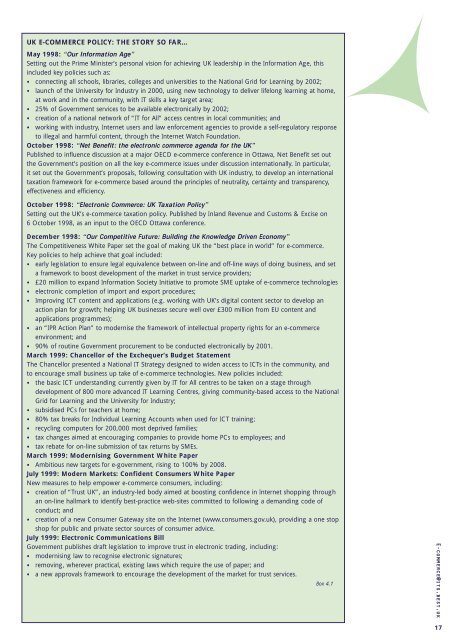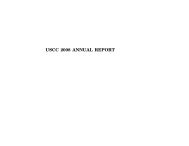e-commerce@its.best.uk - Fatal System Error
e-commerce@its.best.uk - Fatal System Error
e-commerce@its.best.uk - Fatal System Error
- No tags were found...
You also want an ePaper? Increase the reach of your titles
YUMPU automatically turns print PDFs into web optimized ePapers that Google loves.
UK E-COMMERCE POLICY: THE STORY SO FAR…May 1998: “Our Information Age”Setting out the Prime Minister’s personal vision for achieving UK leadership in the Information Age, thisincluded key policies such as:• connecting all schools, libraries, colleges and universities to the National Grid for Learning by 2002;• launch of the University for Industry in 2000, using new technology to deliver lifelong learning at home,at work and in the community, with IT skills a key target area;• 25% of Government services to be available electronically by 2002;• creation of a national network of “IT for All” access centres in local communities; and• working with industry, Internet users and law enforcement agencies to provide a self-regulatory responseto illegal and harmful content, through the Internet Watch Foundation.October 1998: “Net Benefit: the electronic commerce agenda for the UK”Published to influence discussion at a major OECD e-commerce conference in Ottawa, Net Benefit set outthe Government’s position on all the key e-commerce issues under discussion internationally. In particular,it set out the Government’s proposals, following consultation with UK industry, to develop an internationaltaxation framework for e-commerce based around the principles of neutrality, certainty and transparency,effectiveness and efficiency.October 1998: “Electronic Commerce: UK Taxation Policy”Setting out the UK’s e-commerce taxation policy. Published by Inland Revenue and Customs & Excise on6 October 1998, as an input to the OECD Ottawa conference.December 1998: “Our Competitive Future: Building the Knowledge Driven Economy”The Competitiveness White Paper set the goal of making UK the “<strong>best</strong> place in world” for e-commerce.Key policies to help achieve that goal included:• early legislation to ensure legal equivalence between on-line and off-line ways of doing business, and seta framework to boost development of the market in trust service providers;• £20 million to expand Information Society Initiative to promote SME uptake of e-commerce technologies• electronic completion of import and export procedures;• Improving ICT content and applications (e.g. working with UK’s digital content sector to develop anaction plan for growth; helping UK businesses secure well over £300 million from EU content andapplications programmes);• an “IPR Action Plan” to modernise the framework of intellectual property rights for an e-commerceenvironment; and• 90% of routine Government procurement to be conducted electronically by 2001.March 1999: Chancellor of the Exchequer’s Budget StatementThe Chancellor presented a National IT Strategy designed to widen access to ICTs in the community, andto encourage small business up take of e-commerce technologies. New policies included:• the basic ICT understanding currently given by IT for All centres to be taken on a stage throughdevelopment of 800 more advanced IT Learning Centres, giving community-based access to the NationalGrid for Learning and the University for Industry;• subsidised PCs for teachers at home;• 80% tax breaks for Individual Learning Accounts when used for ICT training;• recycling computers for 200,000 most deprived families;• tax changes aimed at encouraging companies to provide home PCs to employees; and• tax rebate for on-line submission of tax returns by SMEs.March 1999: Modernising Government White Paper• Ambitious new targets for e-government, rising to 100% by 2008.July 1999: Modern Markets: Confident Consumers White PaperNew measures to help empower e-commerce consumers, including:• creation of “Trust UK”, an industry-led body aimed at boosting confidence in Internet shopping throughan on-line hallmark to identify <strong>best</strong>-practice web-sites committed to following a demanding code ofconduct; and• creation of a new Consumer Gateway site on the Internet (www.consumers.gov.<strong>uk</strong>), providing a one stopshop for public and private sector sources of consumer advice.July 1999: Electronic Communications BillGovernment publishes draft legislation to improve trust in electronic trading, including:• modernising law to recognise electronic signatures;• removing, wherever practical, existing laws which require the use of paper; and• a new approvals framework to encourage the development of the market for trust services.Box 4.1E-<strong>commerce@its</strong>.<strong>best</strong>.<strong>uk</strong>17















